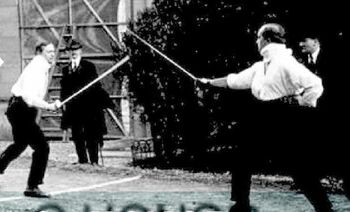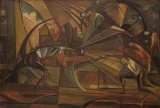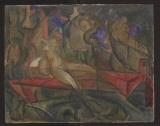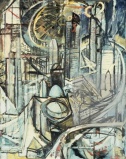Leon Chwistek
 Chwistek in Zakopane, c1912. | |
| Born |
June 13, 1884 Kraków, Austria-Hungary |
|---|---|
| Died |
August 20, 1944 (aged 60) Barwicha near Moscow, Soviet Union |
| Web | Culture.pl, Artyzm, Wikipedia |
| Collections | MS Łódź 7, MN Warsaw 15, MK Kraków 3 |
Polish avant-garde painter, theoretician of modern art, literary critic, logician, philosopher and mathematician.
Contents
Life[edit]
Born 1884 in Kraków. His father was a doctor and his mother a pianist. He spent his youth in the pleasant town of the Tatras (where he formed a close friendship with Witkiewicz, with whom he conducted throughout his life a lively debate on philosophical and artistic matters). He attended school and university in Kraków, where he studied mathematics and philosophy at the Jagellonian University and at the same time attended the Academy of Fine Arts. When he was awarded his doctorate in 1906, he took up teaching at the Sobieski Gymnasium where he himself had been a pupil, and at the same time conducted research under the guidance of W. Heinrich. Having been granted a scholarship, he went abroad to study logic and mathematics, and attended the lectures of Hilbert and Poincaré (at the University of Ghent, 1909). The result of this period of study was his first work, dedicated to the principle of non-contradiction and inspired by the works of Russell, Fechner, and Whitehead.
1910-1912 studied paintings by Tintoretto and Titian during his trips to Italy; admiration for which is reflected in his own later painting executed in delicate, translucent colours; he also rejected the idea of a total break with the past, for such a rupture would include his beloved Renaissance, which he viewed as a period of individualism and total commitment to perfection and purity of style.
After WWI he began lecturing in Mathematics at the University of Kraków, and became a qualified lecturer in 1928. He was given a chair at University of Lwów in 1930 (position for which Tarski had also applied), where he taught until the outbreak of WWII, when he emigrated to the Soviet Union (where his political sympathies lay). Here he devoted himself to scientific research and political activity in the Union of Polish Patriots which had its headquarters in Moscow. In 1930s involved in a general system of philosophy of science, published in a book translated in in English 1948 as The Limits of Science.
In the 1920s-30s, many European philosophers attempted to reform traditional philosophy by means of mathematical logic. Leon Chwistek did not believe that such reform could succeed. He thought that reality could not be described in one homogeneous system, based on the principles of formal logic, because there was not one reality but many. He developed his 'theory of the multiplicity of reality' (wielośc rzeczywistości) first with regard to the arts; 1918 published his essay Multiplicity of reality in art in 'Maski', an attempt to formulate a response to various hermeneutic theories of art coming from the West, extending to paiting, architecture, poetry, and theatre [1]. He distinguished four basic types of realities, then matched them with four basic types of painting: reality of daily experience and things (common-sense realism) - Primitivism; reality of physical bodies (constructed by physics) - Realism; reality of emotions and sensations (sensory impressions) - Impressionism; reality of imagination (dreams, hallucinations, subconscious states) - Futurism (including Formism) [2]. He didn't intend to constitute a new metaphysical theory. He was a defender of "common sense" against metaphysics and irrational feeling. His theory of plural reality was merely an attempt to specify the various ways in which the term, “real,” is used. Witkiewicz harshly criticized his philosophical views [3]; whose philosophy was based on a monadic character to the individual's existence, embracing a multiplicity of existences, with the world being made up of a multiplicity of Particular Existences.
Died 1944 in Barwicha near Moscow.
Works[edit]
Łódka [Boat], c1919. 37,8 x 47,7 cm. MN Warsaw.
Writings[edit]
On art[edit]
- "Wielość rzeczywistości w sztuce" [The Plurality of Realities in Art], Maski 1-4 (Jan-Feb 1918); repr. in Przeglad Wspolczesny 9 (Apr-Jun 1924); repr. in Wielość rzeczywistości w sztuce i inne szkice literackie, 1960, pp 24-50; repr. in Wybór pism estetycznych, 2004, pp 3-20. (Polish) Chwistek proposed the theory of the "plurality of realities in art" as a reaction against the dualistic model of the avant-garde. Later on, in various interdisciplinary discussions about art, mathematics, poetry, architecture and politics, he argued against agitprop and the missionary stance of the avant-garde, in favour of an open, modern and transnational society.
- editor, with Tytus Czyżewski, Formiści, 6 issues, Krakow, Oct 1919-1921. (Polish)
- "Formizm", 1919; repr. in Wielość rzeczywistości w sztuce i inne szkice literackie, 1960, pp 94-99. (Polish)
- "Formizm", 1920; repr. in Wielość rzeczywistości w sztuce i inne szkice literackie, 1960, pp 100-104. (Polish)
- "Zdanie, jako dwoisty utwór...", 1920; repr. in Tytus Czyżewski, Poezje i próby dramatyczne, Wrocław, 1992, pp 31-32. (Polish)
- [Introduction], in Tytus Czyżewski, Zielone oko. Poezje formistyczne. Elektryczne wizje, Krakow: Gebethner i Spolka, 1920. (Polish)
- "O poezji", 1921; repr. in Polska awangarda poetycka, programy lat 1917-1923. II – manifesty i protesty, ed. A. Lam, Kraków, 1969, pp 234-236. (Polish)
- Wielość rzeczywistości [The Plurality of Realities], Kraków: Zaklad graficzny 'Wisloka' w Jaśle, 1921, 96 pp; repr. in Chwistek, Pisma filozoficzne i logiczne, 1, 1961, pp 30-105. (Polish)
- "Plural Reality in Art", trans. Hannah Rosnerowa, in Aesthetics in Twentieth-Century Poland: Selected Essays, eds. Jean G. Harrell and Alina Wierzbianska, Lewisburg: Bucknell University Press, 1973, pp 66-97. (English)
- "Teatr przyszłości. (I. Krytyka metody genetycznej. II. Problemat formy)", Zwrotnica 1-2 (May-June 1922), Kraków, pp 7-8 & 33-35. (Polish)
- "Tytus Czyżewski a kryzys Formizmu", 1922; repr. in Wielość rzeczywistości w sztuce i inne szkice literackie, 1960, pp 107-112. (Polish)
- with Władysław Strzemiński, "Dyskusja" [Discussion], Forma 3 (1935), Lódź, pp 4-10; repr. in Strzemiński, Pisma, ed. Zofia Baranowicz, Wroclaw: Zaklad Narodowy im. Ossolinskich – Wydawnictwo, 1975. (Polish) Commentary (2005).
- "Überwindung des Begriffsrealismus", Studia philosophica II (1937), pp 1-18. Lecture delivered in Wiener Kreis, 2 March 1936. (German)
On logic and mathematics[edit]
- Books
- The Theory of Constructive Types: Principles of Logic and Mathematics, Krakow: University Press, 1925, 98 pp. Extracted from Annales de la Société Polonaise de Mathématique 2 (1923), pp 9-48; 3 (1924), pp 92-141. (English)
- Granice nauki. Zarys logiki i metodologii nauk ścisłych, Lwow and Warsaw, 1935, xxiv+264 pp; repr. in Chwistek, Pisma filozoficzne i logiczne, 2, 1963, pp 1-232. (Polish)
- The Limits of Science: Outline of Logic and of the Methodology of the Exact Sciences, trans. Helen Charlotte Brodie and Arthur P. Coleman, intro. & appendix Helen Charlotte Brodie, London: Kegan Paul, Trench, Trubner, 1948. (English)
- La méthode générale des sciences positives. L'esprit de la semantique, Paris: Hermann, 1946, 42 pp. (French)
- Papers
- "Trzy odczyty odnoszące się do pojęcia istnienia", Przegląd Filozoficzny XXX (1917), pp 122-151; repr. in Pisma filozoficzne i logiczne, 1961, pp 4-29. (Polish)
- "Antynomje logiki formalnej", Przeglad Filozoficzny 24 (1921), pp 164-171. (Polish)
- "Antinomies of Formal Logic", trans. Z. Jordan, in Polish Logic: 1920-1939, ed. Storrs McCall, Oxford: Clarendon Press, 1967, pp 338-345. [4] (English)
- "Über die Antinomien der Prinzipien der Mathematik", Mathematische Zeitschrift 14 (1922), pp 236-243. (German)
- "Die nominalistische Grundlegung der Mathematik", Erkenntnis 3:1 (1932), pp 367-388. (German)
- with W. Hepter and J. Herzberg, "Les fondements de la métamathématiques rationelle", in Bulletin de l'Académie polonaise des sciences et des letters, Krakow, 1933, pp 253-264. (French)
- "A Formal Proof of Gödel's Theorem", The Journal of Symbolic Logic 4:2 (1939), pp 61-68. (English)
- "Sur les fondements des sciences exactes", Philosophie mathematique, ed. F. Gonseth, Paris: Hermann, 1939, pp 88-91. (French) Review: MacLane (JSL 1940 EN).
- "Ob osnovakh semantiki" [Об основах семантики], Soobscenia Akadémii Nauk Gruzinskoy SSR 4, 1943, pp 187-194; repr. in Studia Logica 24:1 (1969), pp 179-184. (Russian) Review: Mostowski (JSL 1946 EN).
- "Ob aksiome Tsermelo i ee roli v sovremennoy matematike" [Об аксиоме цермело и ее роли в современной математике; Sur l'axiome de Zermelo et son rôle dans les mathématiques contemporaines], Soobscenia Akadémii Nauk Gruzinskoy SSR 3, 1942, pp 981-985; repr. in Studia Logica 24:1 (1969), pp 175-177. (Russian) Review: Mostowski (JSL 1946 EN).
- "Leon Chwistek-Bertrand Russell's Scientific Correspondence", ed. J.J. Jadacki, Dialectics and Humanism: the Polish Philosophical Quarterly 13:1 (1986), pp 239-263. (English)
Fiction[edit]
- Kardynał Poniflet, a novel written in 1906, manuscript destroyed in 1917. (Polish)
- Pałace Boga, a novel written in 1932-33, fragments published in Czas, 1934; edited version appeared in Ateneum, 1939; after WWII reconstructed by Ludwik Bohdan Grzeniewski. (Polish)
Collected writings[edit]
- Wielość rzeczywistości w sztuce i inne szkice literackie, ed. K. Estreicher, Warsaw: Czytelnik, 1960. (Polish)
- Pisma filozoficzne i logiczne (Philosophical and Logical Writings), 2 vols., ed. K. Pasenkiewicz, Warsaw: PWN, 1961 & 1963. (Polish)
- Wybór pism estetycznych, ed. Teresa Kostyrko, Kraków: Universitas, 2004. TOC. (Polish)
- Sens i rzeczywistość, in Karol Chrobak, Niejedna rzeczywistość: racjonalizm krytyczny Leona Chwistka, Kraków: Inter Esse, 2004, pp 317-466. (Polish)
Literature[edit]
Books[edit]
- Kazimierz Pasenkiewicz, Pierwsze systemy semantyki Leona Chwistka, Krakow: Nakl. Uniwersytetu Jagiellonskiego, 1961, 146 pp. (Polish)
- Karol Estreicher jr, Leon Chwistek – biografia artysty (1884-1944), Kraków: Państowowe Wydawn. Naukowe, 1971, 400 pp. (Polish)
- Irena Jakimowicz, Witkacy, Chwistek, Strzemiński: myśli i obrazy, Warsaw: Arkady, 1978, 218 pp. (Polish)
- Ludwik Bohdan Grzeniewski, Leona Chwistka Pałace Boga – próba rekonstrukcji, Państwowy Instytut Wydawniczy, 1979, 232 pp. (Polish)
- Teresa Kostyrko, Leona Chwistka filozofia sztuki, Warsaw: Instytut Kultury, 1995, 161 pp. (Polish)
- Karol Chrobak, Niejedna rzeczywistość: racjonalizm krytyczny Leona Chwistka / Sens i rzeczywistość, Kraków: Inter Esse, 2004, 479 pp. (Polish)
Articles[edit]
- H. Skolimowski, "Colourful philosopher", Polish Perspectives 5:8-9, 1962, pp 122-126. (English)
- M. Wallis, Secesja, Warsaw: Wydanie II. Wydawnictwo Arkady, 1974. (Polish)
- Zofia Baranowicz, Polska awangarda artystyczna 1918–1939, Warsaw: Wydawnictwa Artystyczne i Filmowe, 1979. (Polish)
- Joanna Pollakówna, Malarstwo polskie między wojnami 1918-1939, Warsaw: Wydawnictwo Artystyczne i Filmowe Auriga w Warszawie, 1982. (Polish)
- J.J. Jadacki, "On Leon Chwistek's semiotic views", in Sign, system, function, eds. J. Pelc et al., Berlin-New York-Amsterdam: Mouton, 1984, pp 77-87. (English)
- J.J. Jadacki, "Leon Chwistek-Bertrand Russell's Scientific Correspondence", pp 239-263. (English)
- Włodzimierz Kaczocha, Kultura: studia z historii myśli: Krzywicki, Abramowski, Czarnowski, Chwistek, Warsaw: Państwowe Wydawn. Nauk., 1991, 107 pp. (Polish)
- Irena Kossowska, "Leon Chwistek", Culture.pl, 2001. (English)/(Polish)
- Karol Chrobak, "Leon Chwistek - In Memoriam", Estetyka i Krytyka 2:5 (2003). (Polish)
- Markus Eberharter, "Zur Literaturtheorie des polnischen Formismus", 2004. (German)
- Kazimierz Piotrowski, "Antyunizm Leona Chwistka - o defensywnej fazie awangardy lat trzydziestych", Artium Quaestiones 15, Wydawnictwo Naukowe UAM, 2004, pp 139-180. (Polish)
- Karol Chrobak, "W pryzmacie rzeczywistości. O Leonie Chwistku", Dekada Literacka 1 (2005). (Polish)
- Marek Bartelik, "The Formists", in Early Polish Modern Art: Unity in Multiplicity, Manchester University Press, 2005, pp 57-91. (English)
- Jan Woleński, "'Wielość rzeczywistości' Chwistka", Dynamis, 1 January 2006. (Polish)
- Markus Eberharter, "Chwistek, Leon Kazimierz", in Enzyklopädie des europäischen Ostens, 2006. (German)
- Stefan Konstanczak, "Od formizmu do strefizmu. Ewolucja poglądów estetycznych Leona Chwistka", Slupskie Studia Filozoficzne 8 (2009), pp 13-29. (Polish)
- Bernard Linsky, "Leon Chwistek's Theory of Constructive Types", in The Golden Age of Polish Philosophy: Kazimierz Twardowski's Philosophical Legacy, eds. Sandra Lapointe, et al., Springer, 2009, pp 203-219. (English)
- Karol Chrobak, "What Plurality of Realities? Some Critical Remarks on the Philosophy of Leon Chwistek", Polish Journal of Philosophy 6:1 (Spring 2012), pp 7-25. [5] (English)
- Małgorzata Geron, "Formiści. Pomiędzy tradycją a awangardą", Zabytkoznawstwo i Konserwatorstwo 43, Toruń, 2012, pp 181-199. (Polish)
- Przemysław Strożek, "The first Polish avant-garde: Formists in Cracow", in The Oxford Critical and Cultural History of Modernist Magazines, Vol. 3: Europe 1880-1940, New York: Oxford University Press, 2013, pp 1188-1195. (English)
- Przemysław Strożek, "Pismo Formiści i początki międzynardowych kontaktów polskiej awangardy", Rocznik Historii Sztuki, 2013, pp 71-87. (Polish)
Documentary films[edit]
- Wielość rzeczywistości Leona Chwistka, dir. Ryszard Waśko, 14 min, 1978. [6]
- Futuryści, formiści, Nowa Sztuka (odc. 5): Leon Chwistek, dir. Tadeusz Król, 29 min. (Polish)



